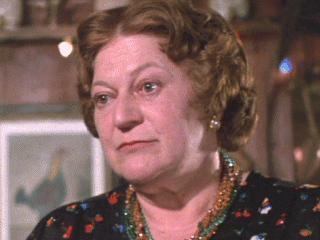Lila Kaye was a British
actress. She spent a number of years working in the United States, on
Broadway and in television, before returning to England died she was 82..
(7 November 1929 – 10 January 2012)
Born in England, she often played motherly and/or comedic characters, mostly on television, notably in My Son Reuben (1975), co-starring Bernard Spear, as a Jewish mother and her bachelor son who jointly run a dry-cleaning business. She also notably appeared in feature films, including roles in An American Werewolf In London, as the conflicted rural barmaid trying to warn off two doomed lost American backpackers, and Nuns on the Run, as a formidable nun.
She appeared as a nurse in a notable Royal Shakespeare Company production of John Vanbrugh's play, The Relapse, at the Aldwych Theatre in London in 1967, alongside, among others, Donald Sinden, Patrick Stewart and Ben Kingsley. She debuted the role of Serafima Ilinitchna in Nikolai Erdman's The Suicide (1979). She was part of the cast of the Royal Shakespeare Company's epic stage production of Nicholas Nickleby on Broadway in 1981.
Kaye starred in the title role of the short-lived U.S. television series Mama Malone a year later, which showcased the uncanny American English accent, that she could adopt at will, which caused most viewers to believe she was American. She made guest appearances on several U.S. television series, such as Murder She Wrote, Cheers, and Dear John (reuniting her with An American Werewolf In London co-star Jenny Agutter). She resided in Florida before returning to England. Her last role was in the British television serial Julia Jekyll and Harriet Hyde in 1998, in which she appeared as "Granny Jekyll". After this role she announced her retirement.[1]
To see more of who died in 2011 click here
(7 November 1929 – 10 January 2012)
Born in England, she often played motherly and/or comedic characters, mostly on television, notably in My Son Reuben (1975), co-starring Bernard Spear, as a Jewish mother and her bachelor son who jointly run a dry-cleaning business. She also notably appeared in feature films, including roles in An American Werewolf In London, as the conflicted rural barmaid trying to warn off two doomed lost American backpackers, and Nuns on the Run, as a formidable nun.
She appeared as a nurse in a notable Royal Shakespeare Company production of John Vanbrugh's play, The Relapse, at the Aldwych Theatre in London in 1967, alongside, among others, Donald Sinden, Patrick Stewart and Ben Kingsley. She debuted the role of Serafima Ilinitchna in Nikolai Erdman's The Suicide (1979). She was part of the cast of the Royal Shakespeare Company's epic stage production of Nicholas Nickleby on Broadway in 1981.
Kaye starred in the title role of the short-lived U.S. television series Mama Malone a year later, which showcased the uncanny American English accent, that she could adopt at will, which caused most viewers to believe she was American. She made guest appearances on several U.S. television series, such as Murder She Wrote, Cheers, and Dear John (reuniting her with An American Werewolf In London co-star Jenny Agutter). She resided in Florida before returning to England. Her last role was in the British television serial Julia Jekyll and Harriet Hyde in 1998, in which she appeared as "Granny Jekyll". After this role she announced her retirement.[1]
Death
She died in Worthing on 10 January 2012, aged 82, following a long illness, survived by her son and grandchildren.[2]To see more of who died in 2011 click here









